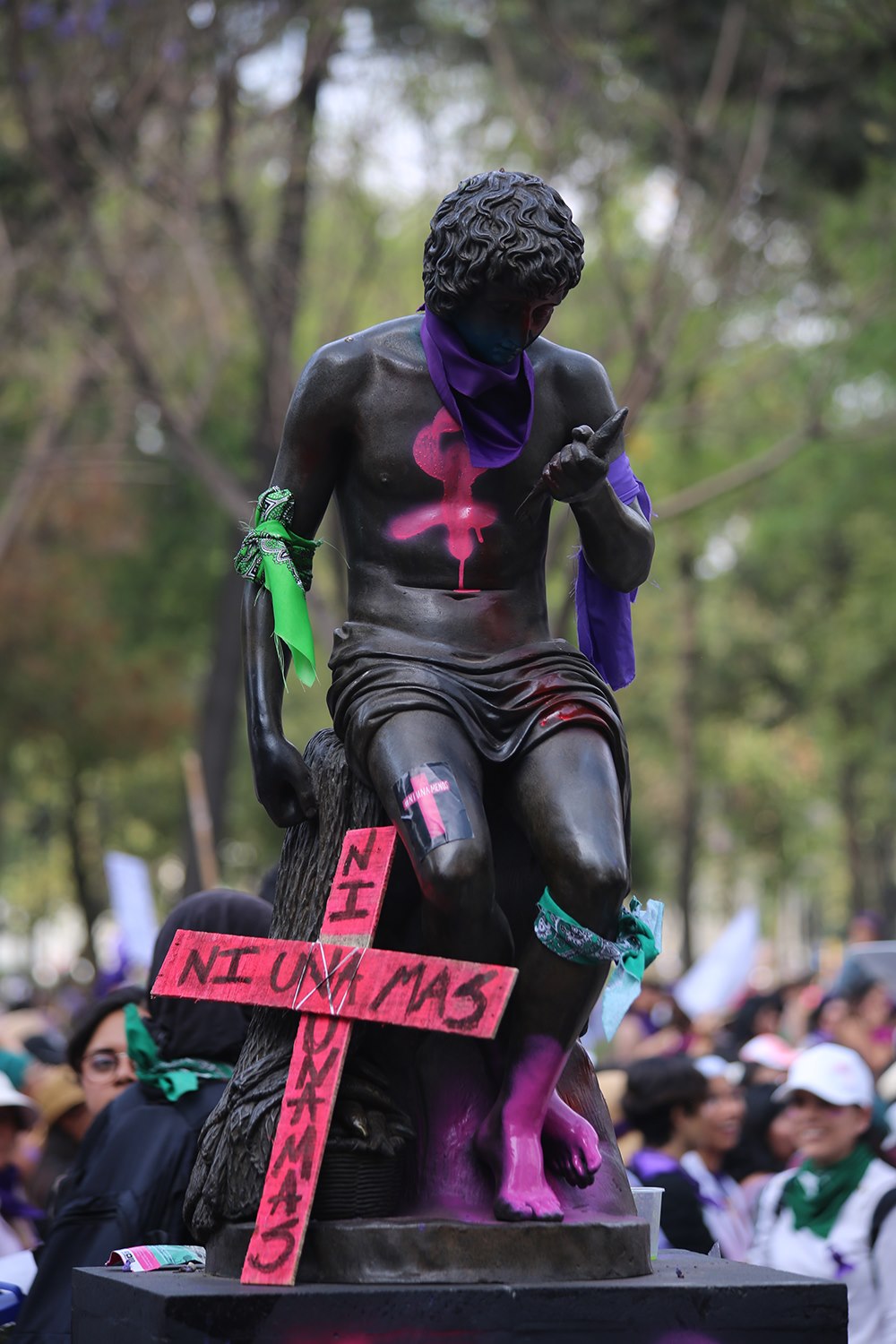Many issues unite feminists around the world, such as the right to abortion, safe contraception, and equal opportunities and pay. In Mexico, however, the feminist cause has been galvanized by a more fundamental right: the right to live.
On March 8, on International Women’s Day, Mexican women took to the streets in record numbers. Over 80,000 women marched in the capital Mexico City dressed in purple or lavender to denounce a culture that allows femicides to reach proportions of mass murder, and to cry out for justice in a society where there is impunity for murderers and rapists. This was followed the next day by a 24-hour strike by Mexican women.

Two murders, those of 25-year-old Ingrid Escamilla and 7-year-old abducted schoolgirl Cecilia Aldrighett, shocked the nation for their horrific nature, and for the sensationalist ways in which the tabloid press reported the murders and displayed the images.
But these deaths are nothing new, and femicides have sadly provided daily news fodder in a country in which, on average, ten women are murdered every day and less than 5 percent of crimes are solved. What is new, however, is the scale of women’s protest and resistance to these murders, and the fact that a younger generation of women and girls are now involved.
Hashtag and Protest Activism
The massive numbers of protesters are the result of years of hashtag and protest activism to raise collective awareness and outrage. The hashtags and march slogans calling for no more women to be killed, such as #NiUnaMenos (#NotOneLess), reveal a deliberate mass grassroots and collective effort to break the imposed silence around sexual assault and the murders of women.
Although #NiUnaMenos went viral in 2014, the slogan was adapted from the words of activist and poet Susana Chavez, who called for “¡ni una muerta más!” (not one more death) during the outbreak of femicides in Ciudad Juárez, just across the U.S. border, before she herself was murdered in 2011.
In April 2016, waves of women protested throughout 40 cities in Mexico over that year’s femicide rate of 7 women murdered a day. In that same year, #MiPrimerAcoso (#MyFirstAssault) went viral as thousands of women bravely shared their first experiences of sexual assault among their social networks, often naming for the first time experiences that their youngers selves had no words for.
“What are they going to do without us if they are killing us?”
Thousands of women in Mexico are protesting increasing femicides and gender violence through “A Day Without Women.” They’re staying home from work or school so society can feel the impact of the absence of women. pic.twitter.com/OMKlTiwj1G
— AJ+ (@ajplus) March 9, 2020
Sadly, with each newsworthy murdered victim, a new hashtag movement is born. Before the world was brought to account during the 2017 #MeToo wave, Mexico exploded with #SiMeMatan (#IfTheyKillMe). This hashtag went viral after authorities tried to discount the murder of student Lesvy Berlin Osorio by her boyfriend, falsely claiming that she strangled herself, that she’d dropped out of university, and had drugs in her bloodstream.
In response, women all over the country used the hashtag #SiMeMatan to post what the authorities and media would say to discount their lives if they were murdered.
The collective power of these hashtags and #JuntasyOrganizadas (#TogetherAndOrganized), a hashtag used to organize the mass 2020 march and strike, shows the power of digital social media to empower women who have had enough and are ready to emphatically break the silence around gender-based violence and murder.
Mass Invisibility
The mass turnout on March 8 was followed by an unprecedented day of mass invisibility. Using the hashtags #UnDiaSinNosotras (#ADayWithoutUs), and #UnDiaSinMujeres (#ADayWithoutWomen), Mexican women showed their power through their absence.
Mexicans from all walks of life were visibly absent from workplaces and the streets all over the country, often with the blessing of businesses and municipalities who recognize that it is time for a cultural shift.

Pictures of nearly empty college classrooms and metro cars with only men in them circulated throughout social media. Clearly, not all women could afford to strike, and some of those who couldn’t wore purple as an act of solidarity.
While the media has focused on the protest and strike, these are part of previous and ongoing actions by feminists. In addition to coordinating marches, groups such as #RestauradorasConGlitter, for instance, have covered prominent national monuments with graffiti and glitter. The use of public spaces has made their protests exceptionally visible. In September 2019, these actions were a protest against police assaults of women trying to denounce sexual violence and Mexico City mayor Claudia Sheinbaum’s call for calm and order directed at angry women.
Hashtags that emerged in response were #MeCuidanMisAmigas (#MyFriendsTakeCareOfMe) and #NoMeCuidanMeViolan (#TheyDon’tTakeCareOfMeTheyRapeMe). In social and news media, debates and personal opinions abounded about whether these moves to appropriate public space were activism or vandalism.
Fight for Cultural Change
The supposedly progressive president of Mexico, Andrés Manuel López Obrador, has angered women protesting and striking by claiming that their actions are an attack on his regime. While he likes to blame the policies of neo-liberal previous governments for femicides, under his government, the murders of women have been increasing, and government inaction continues.
According to the Associated Press, reporting on government data, 3,825 women met violent deaths last year, 7 percent more than in 2018.
There has been a call for international solidarity through the hashtag #SupportYourMexicanSisters, helping to amplify Mexican women’s fight for cultural change. On Twitter, this was accompanied by posters with chilling Mexican statistics in Spanish and English: 10 women are killed every day, one girl between 0 and 17 years old is killed every day, and 57 percent of the victims are killed by their partners.
Female reporters doing stories about the feminist protests in Mexico: This is IMPORTANT!
Mexican women need that global audiences listen to what’s happening in the country: “We are seeking international attention”#SupportYourMexicanSisters#ApoyaATusHermanasMexicanas pic.twitter.com/Rbf2Nq4RcL
— Mariana Limón Rugerio (@marianaliru) March 9, 2020
The protests in Mexico were echoed throughout Latin American countries and Spain. Huge marches were seen throughout Central and South America. In Argentina and Chile, women called for the legalization of abortion, but also the end of femicides, gender violence, and perpetrators’ impunity.
Women have escaped from the roles that have been written for them by men, and are refusing the labels of virgin, whore, or damsel in distress waiting to be rescued by a hero, president, or judge. Rather, as the chant/dance/performance of “Un violador en tu camino” (“a rapist in your path”) originated by the feminist collective LasTesis in Chile, and performed across the world states, the men and infrastructure who should protect women’s rights are in fact their rapists, whether through actions or through complicity.
Disclaimer: The views and opinions expressed here are those of the author and do not necessarily reflect the editorial position of The Globe Post.























